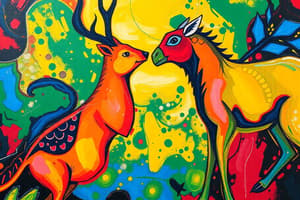Podcast
Questions and Answers
What is animal behavior?
What is animal behavior?
The coordinated responses of whole living organisms to internal and/or external stimuli.
Which of the following disciplines focuses on observing behavior in natural settings?
Which of the following disciplines focuses on observing behavior in natural settings?
- Ethology (correct)
- Cognitive Ethology
- Behavioral Ecology
- Comparative Psychology
Who proposed the classification of the animal kingdom in Scala Naturae?
Who proposed the classification of the animal kingdom in Scala Naturae?
Aristotle
What did Charles Darwin argue regarding behaviors and natural selection?
What did Charles Darwin argue regarding behaviors and natural selection?
Which researcher is considered a founding father of Ethology?
Which researcher is considered a founding father of Ethology?
True or False: Cognitive Ethology focuses on the observed behavior of animals in natural settings.
True or False: Cognitive Ethology focuses on the observed behavior of animals in natural settings.
The study of animal psychology and behavior is known as ______.
The study of animal psychology and behavior is known as ______.
What is the focus of Behavioral Ecology?
What is the focus of Behavioral Ecology?
Match the following theorists with their contributions:
Match the following theorists with their contributions:
Flashcards are hidden until you start studying
Study Notes
Definition and Significance
- Behavior refers to the coordinated responses of living organisms to stimuli, raising questions about capabilities, motivations, and mechanisms.
- Animal behavior fascinates humans, seen through historical connections in Paleolithic art and survival practices.
Scientific Study of Animal Behavior
- Ethology: Biological study emphasizing natural observation and the adaptive purpose of behaviors.
- Comparative Psychology: Studies common and divergent behavioral processes across species.
Trends in Research
- Behavioral Ecology: Investigates optimal foraging strategies, exemplified by John Krebs’ studies.
- Sociobiology: Focuses on social behaviors, particularly in eusocial insects as studied by E.O. Wilson.
- Cognitive Ethology: Explores complex thinking in animals, led by Donald Griffin.
- Evolutionary Psychology: Uses evolutionary biology to understand human and animal behaviors, pioneered by David Buss.
Historical Contributions to Animal Behavior
- Aristotle: Classified animals and posited that behavior serves goals or functions.
- Descartes: Introduced the concept of mind/body dualism; animal behavior attributed to reflexes.
- Darwin: Proposed behaviors as products of natural selection, asserting mental continuity in emotional expressions between species.
Key Figures and Concepts
- George Romanes: Advocated for the presence of consciousness in animals, developed concepts of phyletic affinities and ejictive inference.
- C. Lloyd Morgan: Introduced Morgan's Canon, advocating for simplicity in behavioral explanations.
European Tradition in Ethology
- Niko Tinbergen: Investigated the function of behavior; known for studies on spatial memory in wasps.
- Konrad Lorenz: Developed evolutionary and motivational models of behavior, known for research on imprinting.
American Tradition of Behaviorism
- B.F. Skinner: Known for operant conditioning and reinforcement schedules in behavior study.
- Daniel Lehrman: Critiqued instinctual behavior concepts; explored behavioral endocrinology in doves.
Proximate vs. Ultimate Causation
- Ethology Aims: Tinbergen identified key analysis levels:
- Mechanism: Analyzes stimuli eliciting behavior.
- Development: Examines how behavior shifts with maturity.
- Survival Value: Investigates behavior's impact on survival and reproduction.
- Evolutionary History: Studies behavioral variation across different phylogenies.
Genetic Influences on Behavior
- Behaviors influence reproductive success and are subject to selective pressures within the context of genetic inheritance across generations.
Studying That Suits You
Use AI to generate personalized quizzes and flashcards to suit your learning preferences.




